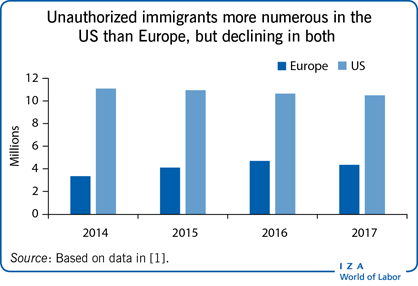Elevator pitch
Countries have adopted a variety of legalization programs to address unauthorized immigration. Research in the US finds improved labor market outcomes for newly authorized immigrants. Findings are more mixed for European and Latin American countries where informal labor markets play a large role and programs are often small scale. Despite unclear labor market outcomes and mixed public support, legalization will likely continue to be widely used. Comprehensive legislation can address the complex nature of legalization on immigrants and on native-born residents.
Key findings
Pros
Legalization allows unauthorized immigrants to come out of the shadows, reducing risks of workplace exploitation and increasing mobility.
Better job matches may result from legalization, increasing wages and non-pecuniary benefits.
Tax revenues may rise as more immigrants start paying taxes or contribute more as their incomes rise.
Legalization may result in increased investment in education and health and lead to reduced crime.
Legalization can address some humanitarian and political concerns by allowing access to social services, higher education, and equal protection under the law.
Cons
Legalization programs may attract more unauthorized immigration, which may have security implications.
Legalization may have negative consequences for workers who compete with newly regularized immigrants, through increased competition for jobs and lower wages.
Government budgets may be negatively affected due to increased spending on social services and use of tax credits.
Issues of fairness make legalization a politically contentious tool for dealing with unauthorized immigrants.
